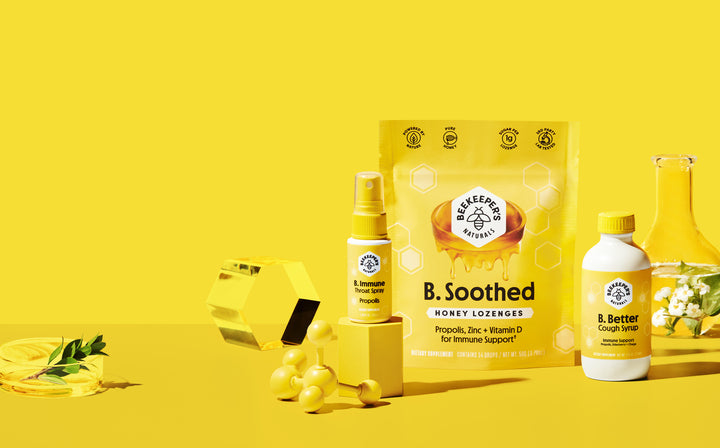Sophia Lafargue finds her calm in beekeeping. As a full-time policy-maker, student, and mother of four, the bees offer her something she wouldn’t get much of otherwise: peace. “There's something enchanting about the power of the bees. Just the sound alone is this wonderful music,” Lafargue tells Beekeeper's Naturals.
On days she has a lot going on (so.. almost every day for Lafargue), bees bring her back to the present. Ahead, she walks us through a day in her life of advocacy and beekeeping, the number one lesson bees have to teach us, and why caring for the hive is a form of meditation.
Walk us through a day in the life of Sophia.
I work in foreign affairs policy-making as my day job, and do volunteer work advocacy for the bees. I keep bees on the Yale campus because my husband is the dean of one of the undergraduate colleges here, and I engage with students at least once a week to get the word out about beekeeping. It’s nice to have the world of beekeeping because policy-making in a legislative body tends to be very process oriented: You have to enjoy the process and you may never get to the final product because of all the compromising and negotiating. But when I'm out there with the bees, I'm going to get to a satisfactory endpoint—most likely. So I can enjoy not only the process, but the satisfaction of an actual tangible result.
I'm quite busy at the height of the season when the hives are full and the nectar flow is high. But at this time of year, I'm planning for the spring, educating myself, and developing my management plan for the upcoming beekeeping season. So on a daily basis, I'm not actually interacting most of the time with the bees. Usually, it's about once or twice a week, depending on how many hives I'm managing at the time.
I’m also studying to be a master beekeeper with Cornell University and I have four kids.
Tell me about being in the bee yard—why do you love it?
When people ask me “why bees?” I tell them what beekeeping does for me psychologically. It's so calming. When I'm out inspecting a hive and taking care of the bees, I can't think about anything else. It's a form of mindfulness because I have to be fully present and focus on what's happening in the hive. Hours can go by when I have a full apiary, and I don't even realize it because I'm so intensely focused. I have tens of thousands of these beautiful insects to care for.
Working with the bees is a fascinating way to just be super present. I tried to impart that on the high school and college students that I work with, or just anybody who comes to me for mentorship with beekeeping. Part of the gift of beekeeping is the people. We're a unique bunch, so you have an automatic community of folks who are concerned about the same thing. A lot of beekeepers also have livelihoods outside of beekeeping and what we bring to the table is pretty fantastic.
You consider bees teachers—what lessons have you learned from them?
Bees are a feminist society and a super-organism. For the bees, it's not about the individual survival. They know instinctively that they cannot survive individually. Everything is done as a unit in a way that just fascinates me. It's a beautiful, beautiful lesson for us to learn: We need one another.
Every beehive is a monarchy in the sense that there is a queen to the hive and they all tend to her and take care of her, but there's a fascinating democratic aspect to the superorganism, too. When it's time to leave the hive because it's getting crowded and they're going to swarm, they actually have a committee of scout bees that go out to find where the next home will be for them. They vote on it. They also decide the fate of the queen bee based on her productivity. Meaning, whether or not she’s keeping the hive populous enough. So the queen is super powerful, but her fate is dependent on how she provides for the rest of the hive. There is no individual decision. It's all based on what is for the greater good of this superorganism.
How do bee products supercharge your happiness and health?
There are some things that have survived in terms of human understanding of their medicinal health benefits—and honey and hive products are among them. Honey iself is anti-inflammatory. Propolis survived in Egyptian tombs without deteriorating. It was used as a salve for some centuries and in our society, it still is. We love empirical evidence and the health benefits of honey have been passed down for centuries. It's exciting—and I certainly love my tablespoon a day.





